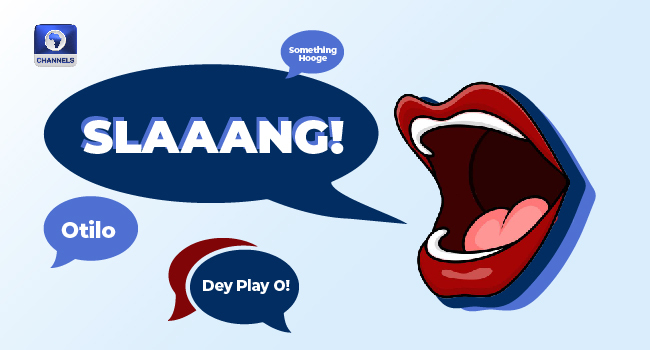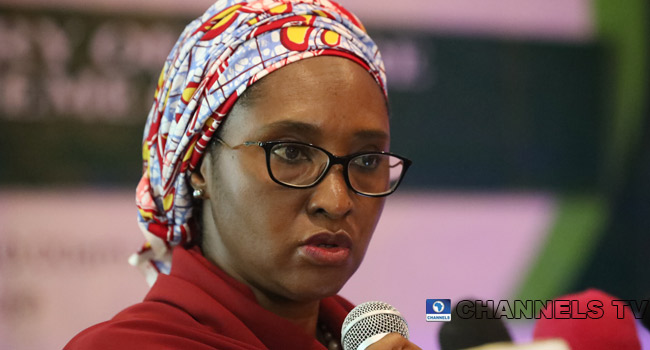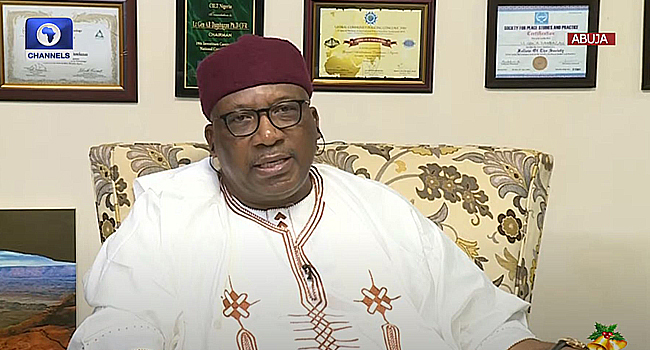
The year 2022 has been a roller coaster of emotions in all ramifications, particularly in pop culture. Even at that, it also saw the emergence of slangs that created a buzz on social media and beyond.
In Nigeria, the year came with much noise as campaigns for the 2023 general elections entered full swing. Presidential and governorship candidates came with their A-game to campaigns, introducing new words which have dominated everyday conversations in the country.
While some of these buzzwords were coined from the political scene, others are gotten from songs, movies, comedians, poverty line, and relationship sagas amongst others. Most of these slangs are derived from the ‘Pidgin arena’.
READ ALSO: Four Critically Injured At Asake’s London Concert Venue
This post highlights these popular slangs and how they came into being/taken a centre stage in conversations. So, let’s go!
Shey you dey whine me ni?
Austine Emmanuel wasn’t joking when he released the track ‘Shey you dey whine me ni’. The Ogoni singer gave youngsters a track to accompany their videos on social media particularly TikTok.
In a video that’s trending on YouTube, a group of older women dressed in traditional attires are seen holding white handkerchiefs dancing in a circle around the act who is providing the vocal performance.
Omo!
Without a specific meaning, ‘Omo’ is used to express excitement, shock, and surprise amongst others. It has also saved a number of youngsters from unnecessary explanations.
Whenever a surprising event takes place and you don’t have anything to say but don’t want those around to feel as though you’re snubbing them, give them an ‘Omo!’ You can decide to add one million O after the M to show that you are truly surprised.
PS: I’m not teaching you ‘bad thing’ but I come in peace.
We outside!
Moving away from this, whenever you hear “we outside”, especially on a Friday night, that person is telling you they are having fun or what younger people call “chopping the life of his or her head”.
You too can be “outside”, and spend this money, after all, you’ve been working since January and now it’s December. Go outside and have fun!
Pepper don set
And to be “outside,” one has to be financially loaded! That’s where the slang “pepper don set” comes in!
Pepper in this context is a reference to money. When pepper is set, December, as they say, will be ‘detty’ (be fun)! “Pepper don set” is an announcement that ‘money is here’ in abundance.
Japa
Once “pepper don set”, plenty plans can become realities which is why “japa” is now a common jargon among Nigerian youths.
“Japa” originated from the Yoruba language and it means to run swiftly. But once you hear “Japa”, it tells you the person wants to travel abroad.
Youths have caught the “japa” bug and are either going abroad for study, work, or other purposes. The lingo can also mean travelling to other places within the country. A person in Lagos might tell you they want to “japa” to Abuja. After all, “japa” is still “japa”.
‘Where una dey see dis love?’
This question is often used whenever two lovers flaunt pictures of themselves on social media. Singles better called ‘Single pringles’ usually take to the comment section asking “Na where una dey see dis love?” (How did you people do this?) Well, it’s never out of place to ask such a question. I mean, it’s not like you have to pay to do this! So, if you know where they see the love, please share it with us!
Doings!
Similarly, “doings” was among the most used slang for the year in Nigeria. It is an exclamation when an individual appears to live large or show off wealth. It also means a man with a large heart and one who makes things happen!
Emi lokan
Away from doings, the All Progressives Congress (APC), presidential candidate, Bola Tinubu, also helped popularise another slang Emi lokan.
The former Lagos State governor used the phrase in a gathering in Abeokuta, Ogun State while making a case for himself ahead of the APC presidential primary earlier in the year.
“Emi lokan” is a Yoruba phrase that is translated as “It is my turn” and has since Tinubu’s June 2022 comment in Ogun gained mileage on social media.
Away from social media, Nigerians now use Emi lokan in different contexts which boil down to ‘ownership’.
Sora Fun Obirin
Now that I have told you what “emi lokan” means, let’s find out about “sora fun obirin”.
The term was derived from a viral video of an Akure preacher in which he spoke against indecent dressing.
In what seemed like a vision, he crossed to the side of the road and told a man in his car, “Sora fun obirin ooo. Olorun a wa pelu e” which means “Be careful of ladies. The Lord will be with you”.
That slang became an anthem among men as a piece of advice to mostly those they term as casanovas
Something hooge
Aside Tinubu’s comment, Nigerian comedian and skit maker Emmanuel Chuwkwuemeka Ejekwu better known as Sabinus also popularised another buzzword – “something hooge”.
It became a street vocabulary, particularly due to the way he used the term in his skits: laying emphasis on huge!
“Something hooge” is a term for anticipation or expectation.
“Something hooge” is about to happen, so be expectant!
Dey play
From Sabinus’s “Something hooge”, the phrase “Dey play” is also a contention for the most used phrase in the country.
It means to continue wasting time; being unserious. It rose to fame on social just recently.
Usually going with videos in which people show off their successes such as newly-acquired houses or cars, “dey play” is a catchphrase that tells others they need to double up their work and stop being unserious with life.
Sope Otilo
But before then, “sope otilo” had gained mileage in everyday conversations. Singer and songwriter Poco Lee gave Nigerians the slang after the release of his single ‘Otilo’ which is a follow-up to ‘Chop up’ and ‘Yard’.
The term ‘Otilo’ is a Yoruba word that means it’s (Izz) gone!
But before I say ‘Otilo,’ it would be good to divert a bit. Shall I tell you who the number one meme character for the year is? Obviously, Osita Iheme popularly known as Pawpaw!
There’s no common person as common as pawpaw 😂😂😂😂 pic.twitter.com/9M37hQygnC
— Florence Chawai (@Kunubykay) September 1, 2022
Snapshots of the veteran actor have been used to accompany a number of captions that trended on social media all through the year.
And not just memes! Clips of the act have been used to remix tracks of popular musicians. One such track is “Common Person” by Grammy award winner Burna boy.




